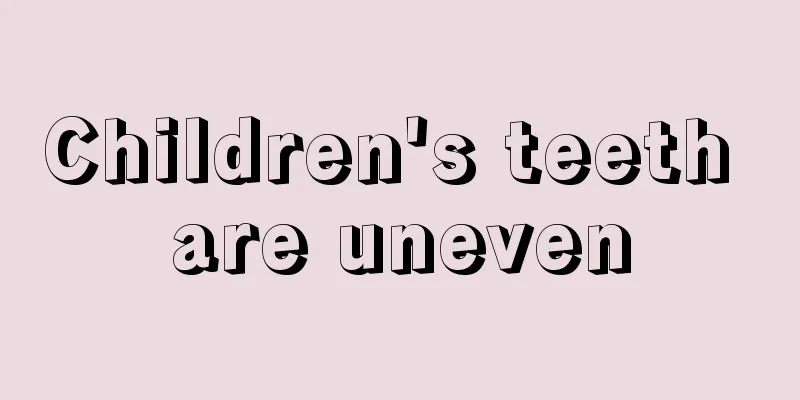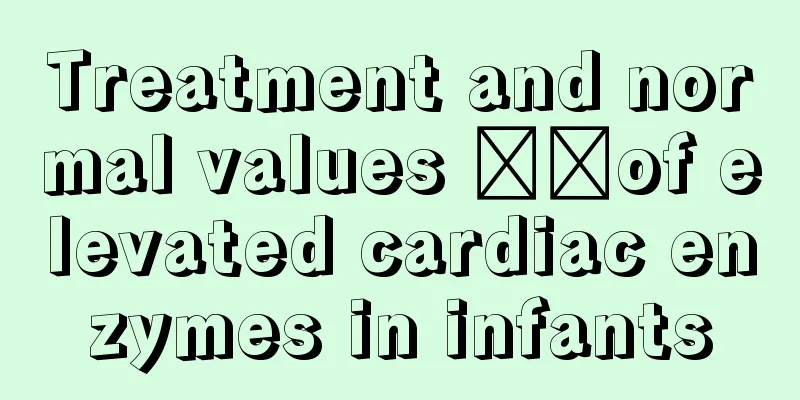Children's teeth are uneven

|
Children need to replace their teeth at certain stages of their growth. Tooth replacement refers to the falling out of the baby teeth in the child's mouth and the growth of normal and healthy teeth. During the period of tooth replacement, children need adequate nutrition, especially sufficient calcium content, to ensure the healthy development of their teeth. However, some parents find that their children's teeth are crooked after their teeth change. So, what should we do if our child’s teeth are not aligned properly? What to do if your child's teeth are uneven The deciduous teeth are replaced by permanent teeth in sequence. The two front teeth grow out first. Due to the squeezing of the permanent lateral incisor germs at their roots, the crowns are often not aligned properly. At the same time, since the permanent front teeth are wider than the deciduous front teeth, the position where the deciduous teeth fall out is not enough for the permanent teeth to stretch, which can also cause the newly grown permanent front teeth to be crowded. This is a normal phenomenon. So, what should we do if our child's teeth are not aligned? As the child's jaw develops and the back teeth are replaced, the permanent teeth will gradually get enough space and slowly align. So don't be anxious, just wait and see. If there is serious malalignment, you should wait until the child is around 12 years old and all permanent teeth have erupted before correcting it. This stage of tooth replacement is the age with a high incidence of caries in permanent teeth. Parents should pay more attention to their children's oral hygiene, help them develop good brushing habits, and master the correct brushing method; take them to the hospital for pit and fissure sealing; take precautions before it happens and effectively control the occurrence of caries. Dental crowding can be divided into mild, moderate and severe crowding according to the degree of crowding. The best way is to undergo orthodontic treatment. Correction must be based on a comprehensive consideration of the degree of crowding, the patient's age, health status, and the development of the jaw and muscles to determine a clear and complete correction plan. Mild crowding can be treated without tooth extraction, and the treatment time is relatively short, about one year. Moderate and severe crowding is generally treated by tooth extraction. Since the extraction space needs to be closed and the occlusion needs to be adjusted, the treatment time is relatively long, about two years. However, the situation of uneven teeth varies from person to person and cannot be generalized. In addition, orthodontic treatment is a complicated treatment, so you must go to the hospital for a detailed examination and treatment by a specialist to achieve satisfactory results. Precautions for children's tooth replacement 1. Always pay attention to the development of teeth Always pay attention to the growth of children's deciduous teeth and permanent teeth, and take children to see a dentist regularly so that problems can be discovered at any time and resolved early. 2. Develop a good habit of brushing your teeth Encourage children to brush their teeth and take good care of their teeth every day. It is best to have an adult help brush your teeth before going to bed at night, especially the upper teeth which are more difficult to clean and are most likely to cause tooth decay. The six-year molars are also not easy to brush because they are located at the innermost part of the mouth. You should use toothpaste and toothbrushes specially designed for children. The toothbrush head should be as small as possible, otherwise the child will easily vomit when the toothbrush reaches the innermost part. In addition to brushing teeth, it is best for children to rinse their mouths after each meal to maintain oral hygiene. 3. Eating hard food During the period of children's tooth replacement, they should eat more foods that are high in fiber and have a certain degree of hardness, such as fruits, carrots, beans, corn, etc., to maintain a good stimulation to the deciduous teeth and promote the shedding of deciduous teeth on time. On the other hand, it also helps to stimulate the facial and eye muscles through chewing movements, accelerate blood circulation, and promote the development of gums, jaws and facial bones, which is both healthy and beautiful. 4. Promote calcium absorption To enhance children's calcium absorption, encourage your baby to eat more foods high in calcium, such as milk, cheese, tofu, canned fish, etc. At the same time, they should take in enough vitamin C and D, because these two vitamins are helpful for calcium absorption. 5. Avoid breathing through your mouth Try to prevent children from breathing through their mouths while they sleep. This is because when air flows through the mouth, the upper palate is subjected to upward pressure and cannot develop downward normally, causing the upper palate to bulge upward, and the left and right sides of the upper dental arch to become narrower, with the front part protruding forward. As a result, the erupted incisors not only tilt forward, but also are misaligned, forming gaps in the teeth. 6. Correct bad habits It is necessary to correct some bad habits of children in time, such as sticking out the tongue, biting the tongue, biting fingers or pencils, licking teeth with the tongue, etc. These bad habits will affect the growth of children's teeth and cause tooth deformation. 7. Protect permanent molars Special protection should be given to the first permanent molar that grows out in children around the age of 6 - the sixth-year molar, because it has the function of positioning and determining the height of the teeth in the entire mouth, has a great impact on the development of the child's jaw and face, and also plays an important role in the eruption and arrangement of other permanent teeth. 8. Avoid accidental tooth loss Children should be given safety education regularly to try to prevent tooth loss due to trauma. |
<<: How long does it take for children's teeth to grow out?
>>: What should I do if my baby has egg drop soup-like diarrhea?
Recommend
What are the recipes for zinc supplementation for babies?
Zinc is an important element that promotes the de...
What happens if children eat too many almonds?
Almonds are very nutritious nuts, rich in fatty a...
Six-year-old child with ADHD
Children are generally very prone to ADHD, becaus...
What is the normal lung capacity of a child?
The health of every child is the most worrying is...
Symptoms of ADHD in a three-year-old baby
For three-year-old babies, this is the time when ...
What should I do if my child has a hunchback?
As parents, of course we hope that our children c...
Why does a child drool at night?
As children grow up, the physical changes that oc...
Chalazion heals itself_Can a chalazion heal itself after it breaks
Chalazion is an eye disease caused by a deficienc...
What to do if your child sneezes and has a runny nose
The most worrying thing for families with babies ...
How to treat obsessive-compulsive disorder in children
The most common group of people suffering from ob...
Is it okay for a baby to sleep in a bed that is too soft?
Some people like to sleep on a soft bed. They thi...
Children's allergic symptoms of taking ceftriaxone
Cephalosporin is a relatively common antibiotic. ...
Causes of white spots on children's neck
If white spots appear on your smooth neck, it is ...
Rehabilitation training for children with hemiplegia
Hemiplegia itself is a terrible thing. If there i...
What should I do if my two-month-old baby's jaundice has not subsided?
Nowadays, many newborns have symptoms of jaundice...









